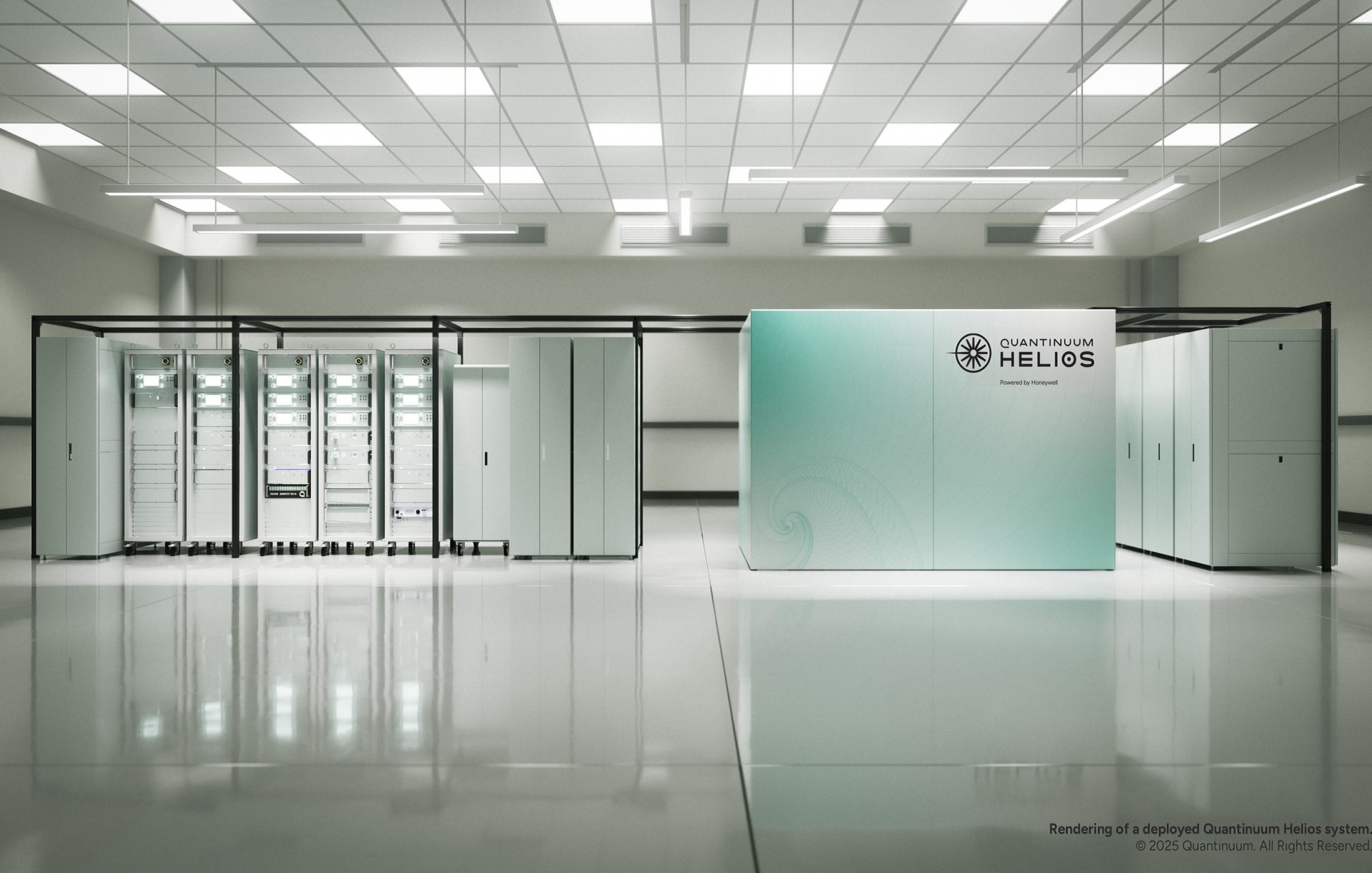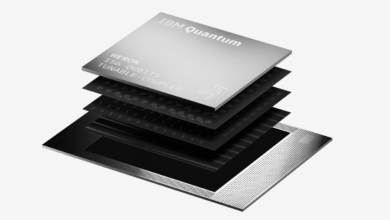Quantinuum Launches ‘Helios’ Hybrid Quantum Computer, To Be Deployed in Singapore

Table of Contents
6 Nov 2025 – Quantinuum, a leading quantum computing firm, has officially launched Helios, a new general-purpose quantum computing system designed for enterprise use. Billed as “the world’s most accurate” commercial quantum computer, Helios is engineered to tackle hybrid quantum-classical workloads and is set to be deployed in Singapore as the company’s first system outside the United States. This launch marks a significant milestone in Quantinuum’s roadmap, combining cutting-edge hardware fidelity with an advanced software stack to accelerate real-world quantum applications.
Helios: Architecture and Hybrid Capabilities
At its core, Helios features a trapped-ion quantum processor with 98 fully connected qubits, achieving record-high gate fidelities (≈99.921% for two-qubit operations). The ion-trap architecture (leveraging Quantinuum’s QCCD design) provides all-to-all connectivity between qubits, a flexibility that gives Helios an edge over fixed-qubit superconducting systems. Notably, Helios introduces the use of barium ions (replacing ytterbium in earlier models) as qubits, which simplifies laser control and even enables automatic error leakage removal at the atomic level. These architectural advances nearly double the qubit count of its predecessor (the H2 system with 56 qubits) while surpassing H2’s already industry-leading fidelity.
On the software side, Helios is built for hybrid quantum-classical integration. It is equipped with a first-of-its-kind real-time control engine and a new Python-based programming language called Guppy, which together let developers program quantum and classical hardware within a single seamless workflow. This means algorithms can incorporate conditional logic and iterative loops that intermix classical computation (on conventional processors) with quantum operations on Helios in real time. Helios also supports industry standards like QIR and NVIDIA’s CUDA-Q, making hybrid development more accessible. In fact, Quantinuum has partnered with NVIDIA to integrate NVIDIA’s GB200 GPUs via NVLink into Helios, using the GPUs (and the CUDA-Q platform) for accelerated classical processing and real-time quantum error correction during executions. This tight coupling of a high-fidelity quantum engine with classical accelerators establishes Helios as perhaps the most programmable and general-purpose quantum computer ever built.
Deployment in Singapore: Building a Quantum Hub
Quantinuum is extending its global footprint by bringing Helios to Singapore through a new strategic partnership with the country’s National Quantum Office (NQO) and National Quantum Computing Hub (NQCH). Under this agreement, Singapore will become the first country outside the U.S. to host a Helios system, with an on-premises installation expected in 2026. Even before the hardware arrives, Singaporean researchers are being given immediate cloud access to Helios, enabling them to begin developing expertise and applications on the platform right away.
The collaboration goes beyond just hardware deployment. Quantinuum will establish a new R&D and Operations Center in Singapore (at the one-north technology district) in early 2026, hiring local engineers and researchers. This facility will serve as a co-development hub where Quantinuum’s team works closely with local institutions and industry partners to build quantum-classical middleware and applications that address commercially relevant problems. The partnership aligns with Singapore’s National Quantum Strategy and is intended to nurture a vibrant quantum ecosystem – including talent development via internships, workshops and training programs – positioning Singapore as a regional leader in quantum computing.
Initial application focus areas in Singapore mirror global high-impact domains for quantum advantage. Researchers will target use cases such as:
- Computational biology and bioinformatics (e.g. quantum-accelerated drug discovery)
- Financial modeling and optimization (for complex portfolio optimization and risk analysis)
- Advanced materials and chemistry (simulating novel materials and chemical reactions)
- Combinatorial optimization (solving complex logistical and AI problems)
By tackling these problems, Helios is expected to significantly expand Singapore’s R&D capabilities, allowing scientists and companies to address larger, more complex challenges that were previously infeasible with classical computing alone. This deployment also marks an important step in Quantinuum’s commercial expansion, bringing its state-of-the-art hardware closer to Asian markets and fostering international collaborations.
From H-Series to Helios: Quantinuum’s Roadmap
Helios represents the next leap in Quantinuum’s hardware roadmap, building on the foundation of its earlier H-Series ion-trap systems (H1 and H2). The first-generation H1 introduced Quantinuum’s highly coherent linear ion-trap design, and the second-generation H2 (with a racetrack ion trap) scaled up to 32 qubits initially and later 56 qubits after upgrades. With Helios’s 98-qubit array and new ion-chip innovations (including the world’s first commercial ion junction for shuttling ions around the chip), Quantinuum has achieved a “huge jump in architectural design” enabling true scalability. In practical terms, Helios can run algorithms of far greater complexity than its predecessors – for example, it was used to simulate quantum magnetism on a 72-qubit problem, a task that would be astronomically difficult to reproduce on any classical supercomputer.
Crucially, Helios is a cornerstone in Quantinuum’s long-term goal of fault-tolerant quantum computing. Quantinuum has publicly announced an accelerated roadmap to achieve fully error-corrected, universal quantum computing by the end of this decade. The Helios platform makes concrete strides toward that goal: it has demonstrated the ability to encode and manage logical qubits with better-than-physical performance (e.g. entangling 94 logical qubits in a single error-detected state, and even achieving 48 error-corrected logical qubits at a 2:1 physical-to-logical qubit ratio). These are record-breaking results – accomplished with advanced error-correcting codes and real-time decoding using NVIDIA Grace Hopper GPUs – that show a viable path toward scalable, fault-tolerant systems. In short, Helios not only provides immediate high-performance computing for users, but also serves as the testbed for Quantinuum’s forthcoming generations (with code names like Apollo on the horizon) that aim to achieve quantum advantage at scale. “For the first time, enterprises can access a highly accurate general-purpose quantum computer to drive real-world impact,” said Quantinuum CEO Dr. Rajeeb Hazra, underscoring Helios’s role in transforming how industries innovate from finance to materials science.
Partnerships and Use Cases Driving Adoption
Quantinuum has positioned Helios as an enterprise-ready platform, and a growing network of partnerships is shaping its adoption. The system is delivered via a flexible Hardware-as-a-Service model – accessible through Quantinuum’s cloud service or as an on-premise installation – which lowers barriers for organizations to experiment with quantum computing. Upon launch, early adopters from various industries were already on board, illustrating the range of use cases Helios can tackle. These include major companies and research partners such as:
- Amgen – collaborating with Quantinuum on hybrid quantum machine learning for biologics drug discovery
- BlueQubit – applying quantum computing to AI-driven image recognition using real-world autonomous driving data
- BMW Group – researching new materials (like fuel cell catalysts) to advance sustainable mobility
- JPMorgan Chase – exploring Helios’s potential for advanced financial analytics and risk modeling
- SoftBank Corp. – investigating quantum methods for next-generation batteries, optical switches, and solar cell materials
In addition to enterprise clients, Quantinuum is expanding its ecosystem through initiatives like “Q-Net”, a new user group for customers to share feedback and collaborate, and a startup partner program to encourage third-party developers to build applications on Helios. The company’s deepening technical partnership with NVIDIA is also critical – by leveraging NVIDIA’s GPU technology for error correction and potentially AI integration, Helios is poised to enable workflows in quantum-enhanced AI (GenQAI), where quantum-generated data can improve machine learning models. This could open up novel solutions in data analysis, materials design, and quantum chemistry that blend classical AI with quantum processing.
As Quantinuum continues to execute on its global strategy – from the U.S. and Europe to its new foothold in Asia – the Helios launch solidifies its commercial positioning at the forefront of the quantum industry. With unmatched accuracy and a hybrid-ready design, Helios exemplifies the transition of quantum computing from laboratory research to an enterprise technology that can address practical problems. The deployment in Singapore, alongside strategic partnerships in academia and industry, further underscores Quantinuum’s commitment to worldwide collaboration and talent development in quantum computing.
Quantum Upside & Quantum Risk - Handled
My company - Applied Quantum - helps governments, enterprises, and investors prepare for both the upside and the risk of quantum technologies. We deliver concise board and investor briefings; demystify quantum computing, sensing, and communications; craft national and corporate strategies to capture advantage; and turn plans into delivery. We help you mitigate the quantum risk by executing crypto‑inventory, crypto‑agility implementation, PQC migration, and broader defenses against the quantum threat. We run vendor due diligence, proof‑of‑value pilots, standards and policy alignment, workforce training, and procurement support, then oversee implementation across your organization. Contact me if you want help.



